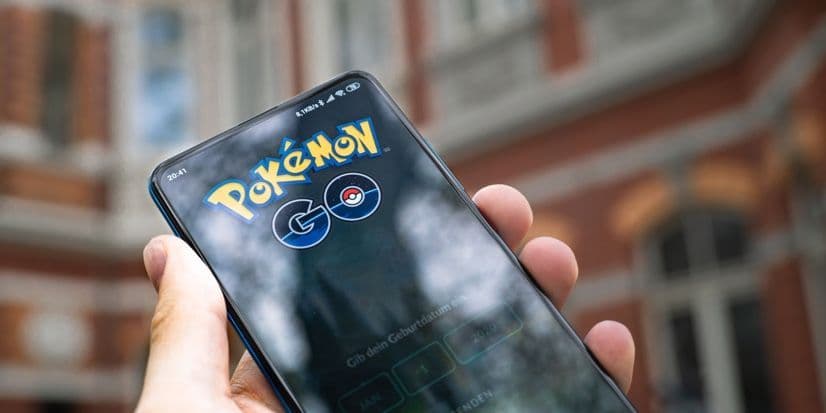app development
trends
+ 4 more ...
Top 6 Mobile App Development Trends of 2021
04 Jan 2021
by Lotte, Digital Content Specialist
04 Jan 2021
by Lotte, Digital Content Specialist
app development
trends
new year
2021
software
tech
Top 6 Mobile App Development Trends of 2021
Table of contents
Contact us
We will get back to you in the next 48 hours.

2021 Has arrived and brought along an interesting collection of mobile app development advancements, such as Machine Learning, virtual reality, instant apps, and much more.
2020 has nearly come and gone and technological innovations continue to advance like never before. In order to stay ahead of the competition, it’s essential to be up-to-date with the latest trends in mobile app development. We took a dive into the wondrous world of mobile apps in 2021, and listed the top 6 mobile app development trends of the coming year, so you don’t have to.
1. Machine Learning & AI
Machine Learning technologies and Artificial Intelligence have been at the top of technological advancements for a few years now, which continues to be the case in 2021. Because technological innovations in the field of Machine Learning and AI are advancing so quickly, the app development industry is continuously looking for ways to implement these new functionalities in their development processes. An example of a ML/AI technology that will likely steal the spotlights in 2021 are so-called deepfakes, in which a character in an existing image or video is being replaced with someone else’s face or even voice. Deepfakes are already a major topic of discussion, which will only grow more significant when advancing even more in the coming years.
Machine Learning technologies are based on the practice of teaching machines to independently learn from collections of data. AI refers to the broader theory of teaching machines to perform certain tasks on their own, and more efficient than when done manually. Machine Learning and Artificial intelligence bring along a wide variety of innovative functionalities in applications, such as:
- Facial and speech recognition, for authentication and access to systems
- News/content classification based on your interests
- Sentiment analysis, for analysing the experience of your customers
- Online fraud detection
- Content recommendation, like music or series
- Online customer support with, for example, intelligent chatbots
- Remote device controls, like household gadgets
At Lizard Global, our aim is focused on guiding businesses towards their digital transformation. By implementing artificial intelligence technologies in our digital solutions, we can efficiently automate business processes that were done manually before. With Machine Learning and AI, organizations can greatly optimize their internal processes and thereby save significant amounts of time and effort.
2. Cloud-based Applications
Because of the global COVID-19 pandemic, 2020 has forced many companies to delve into the world of Cloud computing. Because of that, a lot of businesses (such as Google, Zoom, Microsoft, Asana, etc.) have invested heavily in their Cloud infrastructures and offerings. This means that 2021 will start to fully reap the benefits of these investments. Cloud computing provides users with different services accessible through the internet, such as data storage, databases, networking, and software like web apps. Cloud-based services allow users to access, view, edit, and share their work on demand at any time, from any location with a network connection. In a time where remote working is becoming more and more ubiquitous, cloud services forms the ultimate solution, also in mobile apps.
A cloud-based application makes sure that the software itself is deployed in a cloud environment rather than hosted on a local server or device. Besides the fact that cloud computing offers the possibility to work remotely and collaborate with your colleagues, it also saves space. In the case of mobile applications, it’s a great solution to be able to access the functionalities of an app without having to sacrifice storage on your phone. More and more applications are built in such a way that their functionalities are accessible without having to install the app on your phone. In the case of cloud-based mobile applications, (also called “instant apps”) the data is simply accessible through the cloud, at any moment, from any location with an internet connection.
3. Augmented Reality
Extended reality technologies such as augmented reality and virtual reality are hot and happening. These types of immersive technologies are becoming so popular because it greatly improves the engagement between a user and the software. Out of all ER technologies, augmented reality is seen as the most compatible with mobile phones. It immerses the virtual object in real-life surroundings, and can greatly enhance the experience of the functionalities and information within an application. augmented reality, or AR, is the projection of digital images onto real-world objects and in real environments. This innovative technology causes interaction with apps to be much more immersive and engaging.
Nowadays, augmented reality is mostly used in gaming applications, such as Pokémon GO and Harry Potter Wizards Unite. However, there is much more to augmented reality than gaming. Take, for example, Google Maps, which has one of the best in-app AR uses so far. With the functionality of “Live View”, users can navigate with their camera, while the application returns information on the screen about directions and businesses as you move down the road. Looking at the AR applications that are already available, it’s only a matter of time before it becomes a standard functionality in most of our mobile applications.

4. 5G Integration
Most of what we’ve heard about 5G until now hasn’t exactly been positive. However, this new technology has a lot of potential for the optimization of our mobile app experiences. 5G is a successor of a mobile network generation, coming after 1G, 2G, 3G, and 4G. 5G enables a type of network that is made to connect everyone and everything together, including devices, machines, and other innovative technologies. 5G is expected to change the way apps are developed and used, mostly by its increased speed and efficiency. 5G technology in mobile applications is expected to greatly improve network performances and traffic capacity, and will be about 100 times faster than its predecessor 4G.
Because of this increase in capacity, developers can implement an increasing number of features without them having a significant impact on the quality and performance of the app. In other words, mobile applications are becoming more extensive in their features and performance, without negatively impacting the performance of our phones and the app itself.
5. Internet of Things
The Internet of Things, or IoT, revolves around the interconnection of network-connected objects, such as household gadgets and smart devices, that can efficiently communicate with each other via a wireless connection, without human interference. It’s a tech trend that has been around for a while now, but it’s becoming more and more ubiquitous in our lives by the day, including in our applications.
IoT applications allow us to wirelessly and efficiently interact with other smart devices, like the lights in our living room, our car, or our robotic vacuum cleaners. These are just a handful of examples when talking about the potential of implementing IoT in our mobile apps. Besides the interconnectedness with household gadgets, IoT also has an impact on businesses:
Efficient business processes & reduced business expenses
Because of IoT’s interconnected nature, it can greatly improve internal business processes. Take, for example, the wholesale industry. The practice of order management can be made much more efficient and simple by interconnecting order management systems with centralized data management systems on personal devices. Order managers can steer and monitor their internal processes from a remote location, without having to be present at the factory themselves or hire extra employees to manage the business processes.
Tailor-made and personalized marketing campaigns
IoT can greatly help with creating engaging customer experiences by personalizing marketing campaigns. With IoT, businesses can become able to collect and analyze data from social media and other internet usage. This allows data analysts to predict future trends and user preferences. With that information, businesses can create data-driven marketing strategies that are perfectly aligned with the personal interests of their customers.
Optimized customer services
IoT technologies such as mobile card readers that are able to connect with smartphones to complete transactions at the same time allow their users to keep track of their shipped products and can therefore greatly improve the overall customer satisfaction. Businesses can use IoT to personalize advertisements and discounts to fit their target audience segments.
Increased business security
The use of IoT devices can help employers with securing the workplace and ensure the safety of their employees. By using sensors and wearable devices, employees in high-risk environments, such as heavy industries and construction can be monitored at all times. In case of danger, they receive a warning on their personal devices. Besides heavy industries, small businesses can also make use of IoT by interconnected video surveillance systems and smart locks that can be remotely controlled.
6. Innovative Screens & Responsive Designs
Applications aren’t only bound to computer screens or regular mobile screens any longer. The innovation and production of wearable devices such as smartwatches and fitness bracelets have skyrocketed, and will continue to take a significant place on the tech market. Next to that, companies like Samsung and Huawei rolled out the first foldable screen phones. All these new technologies with altered screen dimensions require applications that are tailored to these devices. Looking from the perspective of app development, compatibility will become the norm in 2021. Not only by responsive designs, but also custom-made applications for these alternative devices.
Need a hand?
At Lizard Global, our team is always up-to-date with the latest cutting-edge technologies. Because we provide our clients with digital solutions that are made to last, we’re continuously adapting to the latest trends and development practices. Did you know that we’re working with artificial intelligence? Do you want to know more about the technologies we use to create advanced digital solutions? Don’t hesitate to get in touch with us, and we gladly tell you all about the possibilities modern app development has to offer.

2021 Has arrived and brought along an interesting collection of mobile app development advancements, such as Machine Learning, virtual reality, instant apps, and much more.
2020 has nearly come and gone and technological innovations continue to advance like never before. In order to stay ahead of the competition, it’s essential to be up-to-date with the latest trends in mobile app development. We took a dive into the wondrous world of mobile apps in 2021, and listed the top 6 mobile app development trends of the coming year, so you don’t have to.
1. Machine Learning & AI
Machine Learning technologies and Artificial Intelligence have been at the top of technological advancements for a few years now, which continues to be the case in 2021. Because technological innovations in the field of Machine Learning and AI are advancing so quickly, the app development industry is continuously looking for ways to implement these new functionalities in their development processes. An example of a ML/AI technology that will likely steal the spotlights in 2021 are so-called deepfakes, in which a character in an existing image or video is being replaced with someone else’s face or even voice. Deepfakes are already a major topic of discussion, which will only grow more significant when advancing even more in the coming years.
Machine Learning technologies are based on the practice of teaching machines to independently learn from collections of data. AI refers to the broader theory of teaching machines to perform certain tasks on their own, and more efficient than when done manually. Machine Learning and Artificial intelligence bring along a wide variety of innovative functionalities in applications, such as:
- Facial and speech recognition, for authentication and access to systems
- News/content classification based on your interests
- Sentiment analysis, for analysing the experience of your customers
- Online fraud detection
- Content recommendation, like music or series
- Online customer support with, for example, intelligent chatbots
- Remote device controls, like household gadgets
At Lizard Global, our aim is focused on guiding businesses towards their digital transformation. By implementing artificial intelligence technologies in our digital solutions, we can efficiently automate business processes that were done manually before. With Machine Learning and AI, organizations can greatly optimize their internal processes and thereby save significant amounts of time and effort.
2. Cloud-based Applications
Because of the global COVID-19 pandemic, 2020 has forced many companies to delve into the world of Cloud computing. Because of that, a lot of businesses (such as Google, Zoom, Microsoft, Asana, etc.) have invested heavily in their Cloud infrastructures and offerings. This means that 2021 will start to fully reap the benefits of these investments. Cloud computing provides users with different services accessible through the internet, such as data storage, databases, networking, and software like web apps. Cloud-based services allow users to access, view, edit, and share their work on demand at any time, from any location with a network connection. In a time where remote working is becoming more and more ubiquitous, cloud services forms the ultimate solution, also in mobile apps.
A cloud-based application makes sure that the software itself is deployed in a cloud environment rather than hosted on a local server or device. Besides the fact that cloud computing offers the possibility to work remotely and collaborate with your colleagues, it also saves space. In the case of mobile applications, it’s a great solution to be able to access the functionalities of an app without having to sacrifice storage on your phone. More and more applications are built in such a way that their functionalities are accessible without having to install the app on your phone. In the case of cloud-based mobile applications, (also called “instant apps”) the data is simply accessible through the cloud, at any moment, from any location with an internet connection.
3. Augmented Reality
Extended reality technologies such as augmented reality and virtual reality are hot and happening. These types of immersive technologies are becoming so popular because it greatly improves the engagement between a user and the software. Out of all ER technologies, augmented reality is seen as the most compatible with mobile phones. It immerses the virtual object in real-life surroundings, and can greatly enhance the experience of the functionalities and information within an application. augmented reality, or AR, is the projection of digital images onto real-world objects and in real environments. This innovative technology causes interaction with apps to be much more immersive and engaging.
Nowadays, augmented reality is mostly used in gaming applications, such as Pokémon GO and Harry Potter Wizards Unite. However, there is much more to augmented reality than gaming. Take, for example, Google Maps, which has one of the best in-app AR uses so far. With the functionality of “Live View”, users can navigate with their camera, while the application returns information on the screen about directions and businesses as you move down the road. Looking at the AR applications that are already available, it’s only a matter of time before it becomes a standard functionality in most of our mobile applications.

4. 5G Integration
Most of what we’ve heard about 5G until now hasn’t exactly been positive. However, this new technology has a lot of potential for the optimization of our mobile app experiences. 5G is a successor of a mobile network generation, coming after 1G, 2G, 3G, and 4G. 5G enables a type of network that is made to connect everyone and everything together, including devices, machines, and other innovative technologies. 5G is expected to change the way apps are developed and used, mostly by its increased speed and efficiency. 5G technology in mobile applications is expected to greatly improve network performances and traffic capacity, and will be about 100 times faster than its predecessor 4G.
Because of this increase in capacity, developers can implement an increasing number of features without them having a significant impact on the quality and performance of the app. In other words, mobile applications are becoming more extensive in their features and performance, without negatively impacting the performance of our phones and the app itself.
5. Internet of Things
The Internet of Things, or IoT, revolves around the interconnection of network-connected objects, such as household gadgets and smart devices, that can efficiently communicate with each other via a wireless connection, without human interference. It’s a tech trend that has been around for a while now, but it’s becoming more and more ubiquitous in our lives by the day, including in our applications.
IoT applications allow us to wirelessly and efficiently interact with other smart devices, like the lights in our living room, our car, or our robotic vacuum cleaners. These are just a handful of examples when talking about the potential of implementing IoT in our mobile apps. Besides the interconnectedness with household gadgets, IoT also has an impact on businesses:
Efficient business processes & reduced business expenses
Because of IoT’s interconnected nature, it can greatly improve internal business processes. Take, for example, the wholesale industry. The practice of order management can be made much more efficient and simple by interconnecting order management systems with centralized data management systems on personal devices. Order managers can steer and monitor their internal processes from a remote location, without having to be present at the factory themselves or hire extra employees to manage the business processes.
Tailor-made and personalized marketing campaigns
IoT can greatly help with creating engaging customer experiences by personalizing marketing campaigns. With IoT, businesses can become able to collect and analyze data from social media and other internet usage. This allows data analysts to predict future trends and user preferences. With that information, businesses can create data-driven marketing strategies that are perfectly aligned with the personal interests of their customers.
Optimized customer services
IoT technologies such as mobile card readers that are able to connect with smartphones to complete transactions at the same time allow their users to keep track of their shipped products and can therefore greatly improve the overall customer satisfaction. Businesses can use IoT to personalize advertisements and discounts to fit their target audience segments.
Increased business security
The use of IoT devices can help employers with securing the workplace and ensure the safety of their employees. By using sensors and wearable devices, employees in high-risk environments, such as heavy industries and construction can be monitored at all times. In case of danger, they receive a warning on their personal devices. Besides heavy industries, small businesses can also make use of IoT by interconnected video surveillance systems and smart locks that can be remotely controlled.
6. Innovative Screens & Responsive Designs
Applications aren’t only bound to computer screens or regular mobile screens any longer. The innovation and production of wearable devices such as smartwatches and fitness bracelets have skyrocketed, and will continue to take a significant place on the tech market. Next to that, companies like Samsung and Huawei rolled out the first foldable screen phones. All these new technologies with altered screen dimensions require applications that are tailored to these devices. Looking from the perspective of app development, compatibility will become the norm in 2021. Not only by responsive designs, but also custom-made applications for these alternative devices.
Need a hand?
At Lizard Global, our team is always up-to-date with the latest cutting-edge technologies. Because we provide our clients with digital solutions that are made to last, we’re continuously adapting to the latest trends and development practices. Did you know that we’re working with artificial intelligence? Do you want to know more about the technologies we use to create advanced digital solutions? Don’t hesitate to get in touch with us, and we gladly tell you all about the possibilities modern app development has to offer.
FAQs

What does agile mean?
What is design thinking?
What is Lean Startup?
What is Lean Analytics?







